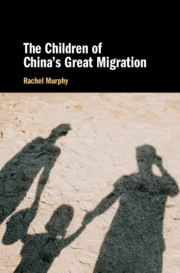Book contents
- The Children of China’s Great Migration
- The Children of China’s Great Migration
- Copyright page
- Contents
- Figures and Maps
- Tables
- Acknowledgements
- 1 Understanding the Lives of Left-Behind Children in Rural China
- 2 Migration, Education and Family Striving in Four Counties of Anhui and Jiangxi
- 3 Sacrifice and Study
- 4 Boys’ and Girls’ Experiences of Distribution in Striving Families
- 5 Children in ‘Mother At-Home, Father Out’ Families
- 6 Children of Lone-Migrant Mothers and At-Home Fathers
- 7 Children in Skipped Generation Families
- 8 Left-Behind Children in Striving Teams
- Appendix: Field Research on Left-Behind Children in China
- Bibliography
- Index
1 - Understanding the Lives of Left-Behind Children in Rural China
Published online by Cambridge University Press: 06 August 2020
- The Children of China’s Great Migration
- The Children of China’s Great Migration
- Copyright page
- Contents
- Figures and Maps
- Tables
- Acknowledgements
- 1 Understanding the Lives of Left-Behind Children in Rural China
- 2 Migration, Education and Family Striving in Four Counties of Anhui and Jiangxi
- 3 Sacrifice and Study
- 4 Boys’ and Girls’ Experiences of Distribution in Striving Families
- 5 Children in ‘Mother At-Home, Father Out’ Families
- 6 Children of Lone-Migrant Mothers and At-Home Fathers
- 7 Children in Skipped Generation Families
- 8 Left-Behind Children in Striving Teams
- Appendix: Field Research on Left-Behind Children in China
- Bibliography
- Index
Summary
Chapter 1 explains the institutional background to the phenomenon of ‘left-behind’ children in rural China, how these children are represented in the media and scholarly literature, and my unique approach to exploring their lives. Firstly, I focus on the influence of rural-urban migration on family relationships rather than on quantifying the impacts of parents’ migration on different dimensions of the children’s wellbeing, as many previous studies have done. Secondly, I see parental migration as oriented towards educational investment, thereby identifying ‘study’ as central to how the children interpret their parents’ migration and their own obligations to their families. This approach extends extant analyses of children’s experiences of family ‘cultural capital’ accumulation strategies from families where parents and children co-reside to families where parental migration is pivotal to the child raising strategy. Thirdly, I argue that left-behind children are actors in spatially dispersed or multi-local parent-child striving teams rather than the passive recipients of adults’ decisions and migration’s various impacts. I thereby prioritise the children’s perspectives rather than adults’ viewpoints, exploring variation among the children by their gender, age, and academic performance, and by their family’s gendered and generational configurations and class, situated within a wider cultural, institutional and economic context.
- Type
- Chapter
- Information
- The Children of China's Great Migration , pp. 1 - 38Publisher: Cambridge University PressPrint publication year: 2020
- 1
- Cited by



